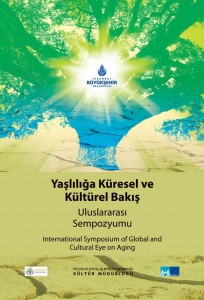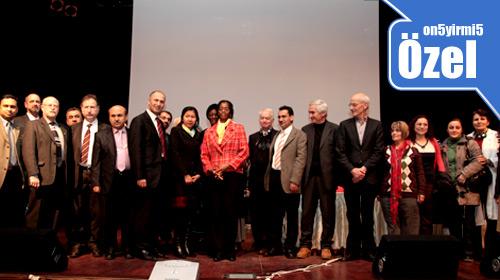International Symposium of Global and Cultural Eye on Aging was held in Istanbul with support of World Aging Council, Istanbul Metropolitan Municipality Culture Co. and Istanbul Trade Organization on March 22nd, 2011.
Opening speech was done by Prof. Torbjörn Svensson. In his speech, he focused on aging services for older adults. He said, “There are a vast number of options for dealing with and providing services for older adults. We have to be able to offer a whole chain of alternative solutions depending on the social and health status of the older person.”
In the first session, Dr. Iftekhar Amin from University of North Texas-Dallas made a speech on retiree abroad, community development, social security and care systems. He stated that by 2050, one out of five of the global population will be 60 years or older. With the aging of the population there has been an interest in understanding the patterns of retirement migration. While in the past retirement migration usually involved return migration to one’s place of origin, recent literature suggests an opposite trend. In the last decade, international retirement migration (IRM) has increased dramatically as a result of an increase in travel and improved communication worldwide that enable retirees to choose destination beyond state boundary. In Europe international migration is reported to be a popular trend, and US retirees are increasingly heading to Latin American countries. In most of the host countries the expatriates live in retirement communities.
Prof. Ali Riza Abay from Yalova University organized his speech around public help and social services for the older adults. In his presentation, he mentioned that today social aid and services for the elderly are provided by the state, voluntary NGO’s, individuals and institutions.
Director of Research Division Janbazan (veterans`) Medical and Engineering Research Center Dr. Reza Amini`s speech was on health related quality of life in the middle aged and old age war survivors with blindness. He said, “Blindness is a situation that people cannot use their vision to communicate with others and their environment. It is the third fear and hardship that follows death and cancer. Mortality risk in blind people is significantly higher than normal population, whereas their life expectancy would be up to 15 years shorter. Visual quality and acuity is an important part of quality of life, though blindness can bring some limitations in personal and social activities which affect health related quality of life.”
Lonzie Symonette from BCC APC made a speech on seniors: breaking the silence on grief and loss, death and dying. In her speech, she mentioned that many feelings of grief and loss are felt when no physical death has occurred. Being honest and honest with self and others by talking about—breaking the silence on grief and loss can be a source of inner healing for the aged and their family.”
The coordinator of the symposium Serif Esendemir from UNT Applied Gerontology delivered a speech on institutionalization of the elderly care in Turkey: Darulaceze (Almshouse) example. In his speech, he stated that aging has moved to the front burner in Turkey with the process of urbanization. This is because it has resulted in important changes in the traditional form of family structure which provide a huge shelter for the aged. The elderly are the group most affected by the dramatic transition from the extended family to the nuclear one. The aged who have been venerated by the family members for a long time have started to be seen as a burden with the hardening of urban living conditions in the cities. This lead to the search for new service models for the aged. Thus the organization of institutions providing services for the elder people has gained importance.
In the second session, Kittiwan Junrith from UNT Applied Gerontology had a presentation on trends and challenges for aging society in Thailand. She stated that
Thailand is the developing country that is coping with a rapid demographic transition because of an increasing number and proportion of the elderly population. The improvement in health care system and technology advancement over the decade results in the demographic changing to aging society. The changing to aging society become more widespread in social, economic, and political issues for government and non-government organization in Thailand.
Erika Symonette from UNT Applied Gerontology delivered her presentation on natural disasters: impact on vulnerable aging populations. She said, “Undoubtedly, Hurricane Katrina generated astounding attention to natural disasters in the United States. It is reported that an estimated 1,330 people were killed by the brutal weather conditions. Social scientists and health care professionals have determined that Hurricane Katrina significantly impacted the surviving frail elderly residents of New Orleans.”
Zeynep Erol Sultanoglu from Istanbul Metropolitan Municipality, Department of Health and Social Services, Directorate of Istanbul Darulaceze had a speech on home design for the aged in Turkey. She mentioned that places of residence for the elderly should be different from “normal” places and some procedures should be taken into consideration while constructing such buildings. As people get older, they face limited mobility and weakness in physical strength which increase the risk of fall. For this reason, we need bigger living spaces for the elderly to move comfortably and safely. In addition to safety procedures, there should be a free consultation about practical solutions to make elderly people’s everyday activities easier. Inappropriate instruments will impose considerable limitations on their quality of life. For instance, elderly people need more light but on the other hand they are more sensitive to light. So we need to use the right light in the right place.
Charles Ewing from University of Jyvaskyla made his speech on Nordic model of health care. In his speech, he argued that with our aging population increasing worldwide many countries are looking at different models of health care. There are three major pillars of the modern Nordic welfare state: social security, health care and free education. The Nordic model of health care established in the 1970`s is one of the first national health care systems in Northern Europe. The Nordic Health care model provides structure for the Scandinavian speaking countries of Denmark, Sweden, Norway, and Finland. In the Nordic countries, the State is involved in financing and organizing the welfare benefits available to the citizens to a greater extent than in most other European countries. The system is universal, covering everyone. In Denmark the government even has a constitutional duty to ensure all citizens can have a home and enough to eat. Each country has its own unique methodology of dealing with its own specific health care issues, but due to a shared history universalism is the norm.
The concluding speech was done by president of the symposium Prof. Stanley R. Ingman from UNT Applied Gerontology on future of aging in developing societies. In his guiding speech for the developing societies, he mentioned that young societies like Turkey are discovering that their population will age relatively fast. Developing the education of their future educators, clinicians and service providers is becoming a significant issue. The history of geriatric medicine and gerontology as disciplines in Europe and USA provides some models to develop educational policy in younger societies.
The symposium was enriched by workshop of Darulaceze Nursing Home and participation of various people from city administrative units and health organizations.
Photo source: http://www.on5yirmi5.com/genc/haber.35376/kuresel-ve-kulturel-anlamda-yasliliga-bakis.html




